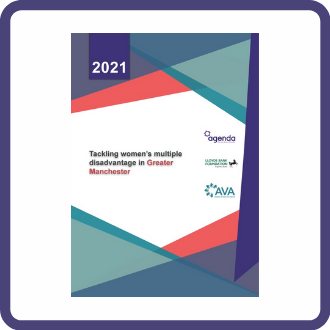 A new briefing by women’s rights charities highlights that over 60,000 women and girls in Manchester have experienced extensive violence and abuse in their lifetime. It calls for all local authorities in Greater Manchester to work together to ensure the most marginalised women are included and involved in its Covid-19 recovery plans. This briefing specifically focuses on women facing multiple disadvantage in Greater Manchester and makes recommendations aimed at decision makers to improve responses. It was funded by the Lloyds Bank Foundation of England and Wales and lots of Manchester-based VCSE organisations contributed to this.
A new briefing by women’s rights charities highlights that over 60,000 women and girls in Manchester have experienced extensive violence and abuse in their lifetime. It calls for all local authorities in Greater Manchester to work together to ensure the most marginalised women are included and involved in its Covid-19 recovery plans. This briefing specifically focuses on women facing multiple disadvantage in Greater Manchester and makes recommendations aimed at decision makers to improve responses. It was funded by the Lloyds Bank Foundation of England and Wales and lots of Manchester-based VCSE organisations contributed to this.
This briefing sets out key strategic recommendations aimed at Greater Manchester Combined Authority (GMCA) and local authority decision makers. These have been developed in consultation with local partners and women with lived experience and highlight key strategic and positive opportunities in the current policy landscape across the Greater Manchester region.
They cover:
- Strategic responses
- Gender and trauma-informed practice
- Co-production and working with experts by experience
- Commissioning and funding
- Responses to COVID-19
Key recommendations
- Commissioners across Greater Manchester, must work with the specialist women’s sector at a regional and local level to ensure that the impacts of the pandemic on women facing multiple disadvantage are recognised and responded to.
- GMCA and local authorities should fully involve the specialist women and girl’s sector when developing strategies, commissioning services and identifying gaps in service provision.
- Public services across Greater Manchester must ensure staff make trained enquiries about domestic and sexual abuse and respond appropriately with clear pathways into appropriate trauma-informed support.
- Women with lived experience of multiple disadvantage must be centred and their contributions prioritised at all levels of decision making across GMCA to help design and commission services differently.
- GMCA should set out clearly in its Gender-based Abuse Strategy, Health and Justice and Homelessness Prevention Strategies commissioning processes and specifications that prioritise long-term funding for specialist women’s services to ensure the sustainability of vital organisations.
The organisations point to strengths in Greater Manchester’s response to date, including taking rapid action to support those rough sleeping during the first national lockdown. They call for the Greater Manchester Combined Authority to act with similar drive and harness opportunities to build on existing good practice in the area to ensure the most disadvantaged women are not further impacted by the pandemic.
To read the briefing click here